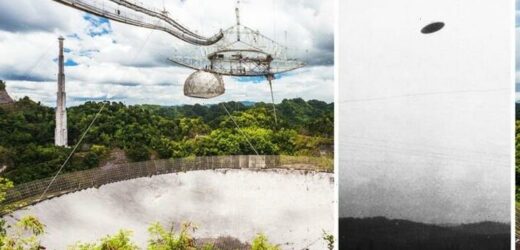Aliens: Conspiracy theorist finds ‘structure’ on the moon
We use your sign-up to provide content in ways you’ve consented to and to improve our understanding of you. This may include adverts from us and 3rd parties based on our understanding. You can unsubscribe at any time. More info
In their quest to find extraterrestrial life, scientists from NASA are planning to broadcast the Earth’s location in outer space, along with nude pictures of a human man and woman. The Beacon in the Galaxy Project (BITG) will send out broadcasts that reveal information about our solar system, human DNA and the Arecibo Radio Telescope.
The Telescope was used in the search for extraterrestrial life and in 1974, it transmitted a similar message to scout out any aliens.
However, the researchers involved in this project may be ignoring the potentially devastating risks, an Oxford Scientist warns.
Anders Sandberg, a senior research fellow at Oxford’s Future of Humanity Institute (FHI), warned that even though the chances of such a message reaching an extraterrestrial civilisation was low, “it has such a high impact that you actually need to take it rather seriously”.
Speaking to the Telegraph, he added that the “giggle factor” which often surrounds the search for alien life meant that “many people just refuse to take anything related to it seriously, which is a shame because this is important stuff”.


Dr Sandberg added that due to the complexities of interstellar travel, it’s possible that broadcasting this signal will amount to little more than “a postcard saying, ‘Wish you were here’ ”.
These concerns were shared by Toby Ord, Dr Sandberg’s colleague at the FHI, who questioned the “ratio of peaceful to hostile civilisations”, in his book The Precipice.
He added: “We have very little evidence about whether this is high or low, and there is no scientific consensus.
“Given the downside could be much bigger than the upside, this doesn’t sound to me like a good situation in which to take active steps toward contact.”

Both the Oxford researchers are echoing warnings issued by noted theoretical physicist, Stephen Hawking who warned against the launch of Breakthrough Listen, which was a $100million project that was aimed at looking for extraterrestrial life in space.
Mr Hawking said: “If you look at history, contact between humans and less intelligent organisms have often been disastrous from their point of view, and encounters between civilisations with advanced versus primitive technologies have gone badly for the less advanced.”
He also warned that aliens that discover the signal “might not see us [humans] as any more valuable than we see bacteria”.
However, Jamilah Hah, a researcher involved in the BITG project, disagrees with Mr Hawking, noting that the benefits could outweigh the potential risks.
DON’T MISS:
Archaeologists were stunned at apparent proof for Jesus’ resurrection [REPORT]
Bulgaria and Greece break EU ranks with new nuclear plan [INSIGHT]
Putin humiliated: 400,000 secret files leaked by hackers [REVEAL]


She told Newsweek: “Stephen Hawking’s quote is absolutely inspiring and my personal conclusion was that any species capable of understanding and interpreting our message will likely be equally if not more intelligent and wary of our existence.
“Thus, as long as contact is approached with a clear sign of peace, it can be assumed that the hopeful possibilities and discoveries that come alongside communication outweigh the risk.”
Source: Read Full Article


